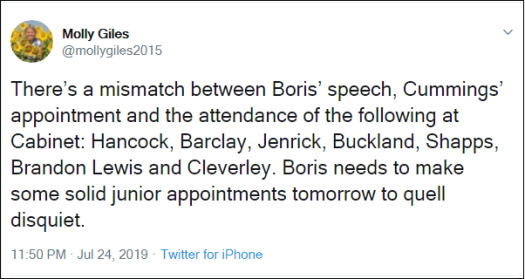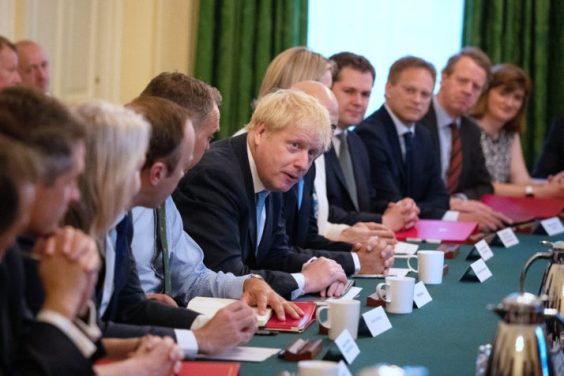Eight key tests, of which delivering a proper Brexit on 31st October is only one, that will determine whether Boris Johnson’s tenure as Prime Minister will be fulfilment or failure
Note: Longer, updated version of the article originally published at The Conservative Woman on Friday 26th July 2019
Expectations matter. After the near-euphoria of the thirty-six hours or so that elapsed last week between Boris Johnson’s victory in the Tory leadership contest, and the completion of his dramatic and rightly stables-cleansing inaugural Cabinet reshuffle, the expectations being projected on to both him and his new administration are so varied as to be probably irreconcilable.
No matter how welcome were the long-overdue defenestrations of May’s Remain-Lite BRINO-loyalists such as Hunt, Mordaunt, Clark, Fox, Lidington, Gauke and the rest, and as much as the new Cabinet was initially hailed by Brexiteers as unashamedly and determinedly pro-Brexit – a Brexit on 31st October without fail, and on a WTO No-Deal basis if necessary – the actual picture is a lot less clear-cut.
Right at the start of the reshuffle, I suggested that a 3:1 ratio of Leavers to Remainers should be the benchmark to justify such a welcome beyond dispute.

That was arguably unrealistic: but what has actually transpired is nothing like it.
True, Number Ten itself and the three “Great Offices of State”, namely Home Secretary, Foreign Secretary, and Chancellor of the Exchequer, are occupied by Leavers, provided one accepts, in the last-named, the commitment of Sajid Javid to the Brexit cause, despite having voted Remain.
It’s difficult to overlook, though, that charged with No-Deal preparations, as Chancellor of the Duchy of Lancaster and Cabinet Office Minister, is the similarly loyal to May’s Remain-Lite BRINO Michael Gove: that other Secretary of State positions have a slew of Remainers in them: and there are some surprising, on the face of it, retentions, rehabilitations, and omissions.
For example, why has Amber Rudd, until very recently doyenne of the anti-Brexit Tory-Remainer Metropolitan-‘Liberal’ Elite, kept her Cabinet seat? Why has prominent Remainer Nicky Morgan been recalled to the Cabinet? Can we be confident their apparent acceptances of Brexit as a democratic necessity are any more than skin-deep expediency? Why is there no place for prominent Brexiteers with past Government experience, like Owen Paterson and David Davis?
And above all, why was Steve Baker given such a derisory job offer that he felt he had no option but to refuse it? This looks like a very bad mistake by Number Ten. A nominally pro-Brexit Government that could not find within it a position that Steve Baker felt able to accept – has it just made a serious error of judgement, or is another agenda is in play? Do the headline appointments mask a more ambivalent commitment reflected in the lower ranks?
It didn’t take committed Conservative Party activists very long to realise that something didn’t appear quite right, and to start questioning the rationale for so many Remainers and at best soft-Brexiteers, supporters of May’s deal, being in a new nominally determinedly pro-Brexit government.

It’s possible, of course, that Boris and his formidable team headed by the mercurial Dominic Cummings and the experienced Eddie Lister are just boxing clever. The language deployed, and guarantees given, by Boris since his accession leave no scope for any Cabinet member to claim later that they weren’t aware, when agreeing to serve, of precisely what they were signing up to.
And, as far as those who were sacked or who resigned in advance are concerned, there’s nothing like neutering the opposition through splitting it, by keeping some in the tent while conspicuously leaving others out of it, to wonder whether their erstwhile colleagues were ever really on their side at all, or, if they were, whether they’ve now sacrificed their opposition for the sake of office. That, however, is a double-edged sword, because, as already appears to be happening, it can also encourage disloyalty among those retained and thoughts of defection among those dismissed.
But a very possible explanation also is the canny realisation that, despite his emphatic victory among the party membership, Boris’ rating among Tory MPs is far less favourable, so that the wafer-thin House of Commons majority, plus outright opposition to No-Deal among many Tory MPs, means that keeping the reluctant, soft-Brexiteers on side via what would, to us, be their over-representation in Cabinet, is probably unavoidable.

However, that factor, combined with the wafer-thin Commons majority, can’t but increase the danger that, Boris’ protestations of willingness to exit on WTO/No-Deal notwithstanding, we may end up with what is little more than a refreshed version of May’s vassal-state (non)-“Withdrawal” Agreement, with re-branded wording on the Northern Ireland backstop, but spun as something different.
Which in turn raises doubts about a Boris-led government’s general direction of travel, apart from Brexit. For all his free-trade, free-market, tax-cutting rhetoric, the suspicion remains that Boris will be more in the One-Nation “Wet” tradition of ‘Liberal’-Conservatism, still very much alive and well in some of his Cabinet choices, than many of his supporters realise, and want.
In few areas is this more evident than in his repeated apparent willingness to pander to the fundamentally eco-totalitarian Green Agenda. He intoned the fashionable but false mantras about “tackling climate-change” and “producing Green jobs” in his speech outside Number Ten on returning from Buckingham Palace. He went even further in his statement to Parliament on Thursday 25 July, extolling and endorsing its recklessly officially uncosted, but estimated to cost at least £1 trillion and 1-2 per cent of GDP, commitment to net zero emissions by 2050, despite its having already been comprehensively debunked.
Make no mistake, Boris will govern as a cosmopolitan centrist, says The Daily Telegraph’s Allison Pearson. How much he can resist the demands of the SJW Continuity-Mayites is a hitherto unknown factor. Remember, Boris’ big weakness is that he loves to be liked. He doesn’t appear to have Margaret Thatcher’s emotional resilience, that imperviousness to criticism and immunity from needing the constant approval of others which is vital in leadership when big, difficult, controversial, and probably unpopular, decisions have to be taken.
I’m especially unconvinced that, if it came to the crunch, he wouldn’t prioritise narrow party survival over upholding the national interest and even democracy itself.
Despite being a Brexit-absolutist, I’m also a Boris-sceptic. Although he was infinitely preferable to his ultimate rival in the leadership contest, Jeremy Hunt, rightly portrayed as Theresa-In-Trousers, he wouldn’t have been my pick as either Tory Party leader or Prime Minister. The least worst option on the ballot paper isn’t necessarily the ideal choice.
So here are eight key tests by which we might judge whether Boris will satisfy, or disappoint us.
Will he ensure – come what may, including if necessary by proroguing Parliament, to prevent its 70%-plus Remainer majority stopping Brexit – that he takes us out of the EU on 31st October, on a WTO No-Deal if Brussels maintains its intransigence, and with Britain as thoroughly prepared for it as possible?
Will he take, or authorise Dominic Cummings to take, an axe to the higher reaches of the Whitehall Civil Service machine which has proved so unwilling to accept our decision to leave the EU, and so hostile to implementing it? As Douglas Carswell points out in this podcast, Brexit has exposed deep and fundamental flaws in Britain’s administrative state, and without tackling its homogeneously pro-EU, left-‘liberal’ groupthink and institutional atrophy, Boris will get little done.
Will he abrogate Britain’s accession to the UN Migration Compact, cynically signed by May largely under the radar in December 2018, and under which it effectively becomes illegal and a “hate-crime” to criticise mass immigration, which the Compact deems an inviolable human right? Because if he doesn’t, his pledge to reduce immigration and control it via an Australian-style points system is just so much hot air.
Will he instruct the new (Remain-voting) Defence Secretary Ben Wallace to unwind all the surrender to the EU of control over policy, rules and structures which govern the future of our Armed Forces which has been deceitfully and surreptitiously undertaken by May since the EU Referendum? Anyone in any doubt about what this means should listen to this Briefings for Brexit podcast from last November.
Will he abandon the futile drive for expensive Green renewable energy, concentrate on developing alternative energy sources that promise reliability of supply at lower cost, and formally abandon the Government’s ill-informed, scientifically-illiterate and economically-damaging commitment to net zero emissions by 2050 of CO2, a colourless, odourless, invisible 0.04% trace gas essential to all plant life on Earth?
Will he commit to rolling back substantial parts of Theresa May’s obsessively politically-correct and divisive left-‘liberal’, SJW agenda, of which mandatory gender pay gap reporting, ethnicity pay disparity audits, and enabling people officially to change their gender in effect via box-ticking with no independent medical justification, are merely some of the more egregious examples?
Will he guarantee to address the pressing issue of voter and electoral fraud, in particular the vulnerability of the lax postal-vote system to rampant abuse, as happened so recently in the Peterborough by-election, and Leftist objections to making ID at the polling booth mandatory in order to be able to vote?
Will he promise to address urgent constitutional reform? In particular the position of the undemocratic and anti-democratic House of Lords, whose role in the Establishment-Elite’s drive to thwart, if not overturn, the popular mandate for Brexit has been widely criticised? Will he undertake to overhaul the corruption and cronyism inherent in the Honours system by which failed politicians ousted by the electorate can be rewarded and sustained in positions of power and influence? Will he end the racket whereby taxpayers are forced to fund the political activities of former Prime Ministers who, despite being rejected by voters, still want to remain active in public life?
Boris comes to office carrying the burden of big expectations, not only about delivering Brexit, but also about re-setting the compass of Conservatism back towards a more traditional direction, after the abjectly Fabian-Blairite tribute-act it has become over its last three dismal decades.
To a certain extent, those expectations are ours, placed on his shoulders after the drift, despair and desperation of the wasted May years. But to a great extent also, they have been created by him. The responsibility to fulfil, and not fail, is his alone. But the trouble with engendering big expectations is that the disappointment and disillusion among those who have invested their hopes in you is all the greater when you do fail. The risks of Boris disappointing, on several fronts, are very, very real.
Thoroughly agree with this article? Vehemently disagree with it?
Scroll down to leave a comment
